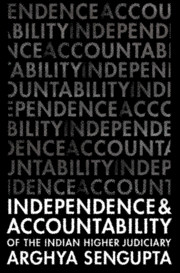Book contents
- Frontmatter
- Dedication
- Contents
- Acknowledgements
- List of Abbreviations
- List of Cases
- List of Statutes
- 1 Introduction
- PART I THE INDIAN EXPERIENCE
- PART II A CONCEPTUAL ANALYSIS
- PART III TYING THE STRANDS
- 8 Harmonising Judicial Independence and Judicial Accountability in India
- 9 Conclusion: A Reform Proposal for the Indian Higher Judiciary
- Epilogue: The Moment the Judiciary Came Out
- Appendix Post-Retirement Employment of Judges in Government-Appointed Positions
- Bibliography
- Index
8 - Harmonising Judicial Independence and Judicial Accountability in India
from PART III - TYING THE STRANDS
Published online by Cambridge University Press: 26 April 2019
- Frontmatter
- Dedication
- Contents
- Acknowledgements
- List of Abbreviations
- List of Cases
- List of Statutes
- 1 Introduction
- PART I THE INDIAN EXPERIENCE
- PART II A CONCEPTUAL ANALYSIS
- PART III TYING THE STRANDS
- 8 Harmonising Judicial Independence and Judicial Accountability in India
- 9 Conclusion: A Reform Proposal for the Indian Higher Judiciary
- Epilogue: The Moment the Judiciary Came Out
- Appendix Post-Retirement Employment of Judges in Government-Appointed Positions
- Bibliography
- Index
Summary
We are now in a position to tie the strands from Parts I and II of the book together. In Part I, a close analysis of systems of appointments, transfers, impeachment and post-retirement employment of judges of the higher judiciary in India revealed grave doubts about the legal basis for the operation of appointments and transfers. It pointed out the ineffectiveness of impeachment as a disciplinary mechanism and the pervasive practice of post-retirement employment of judges in government-appointed positions, often very shortly after retirement. It also documented the widespread concerns regarding the independence of the judiciary and its tension with judicial accountability, while at the same time highlighting that these concepts were being used in a number of diverse ways, often with divergent meanings.
This necessitated a closer conceptual enquiry of judicial accountability and independence in Part II. This was done through a fivefold enquiry into both concepts through which their diverse elements were captured. Fleshing out the rationales for judicial independence and accountability, it was argued that both are necessary for creating ‘an effective judiciary’. The various components of an effective judiciary were delineated together with how judicial independence and accountability impacted them.
On the basis of this normative assessment, in Section 8A a putative doctrinal device—whether the measure in question leads to an effective judiciary—can now be advanced. The purpose of such a device is purely analytical—to provide researchers and observers of judiciaries with a useful tool with which to analyse the justifiability of measures that affect or promote judicial independence or accountability.
Section 8B applies this doctrine to the working of appointments, transfers, impeachment and post-retirement employment of judges in India. It examines the impact each of these mechanisms has on judicial independence and accountability as understood in Part II. On this basis, it infers whether the said measure is justifiable on independence–accountability grounds. No implication ought to be drawn regarding the justifiability of such a measure in terms of other virtues deemed desirable for the judiciary—that is a distinct analytical exercise.
For measures found unjustifiable, Chapter 9 advocates necessary reforms. The proposals advanced do not seek to reinvent the wheel as far as reforms are concerned. Much work has been done on reform and several reform proposals are pending consideration of the government and widely discussed publicly.
- Type
- Chapter
- Information
- Independence and Accountability of the Higher Indian Judiciary , pp. 207 - 234Publisher: Cambridge University PressPrint publication year: 2019
- 1
- Cited by



